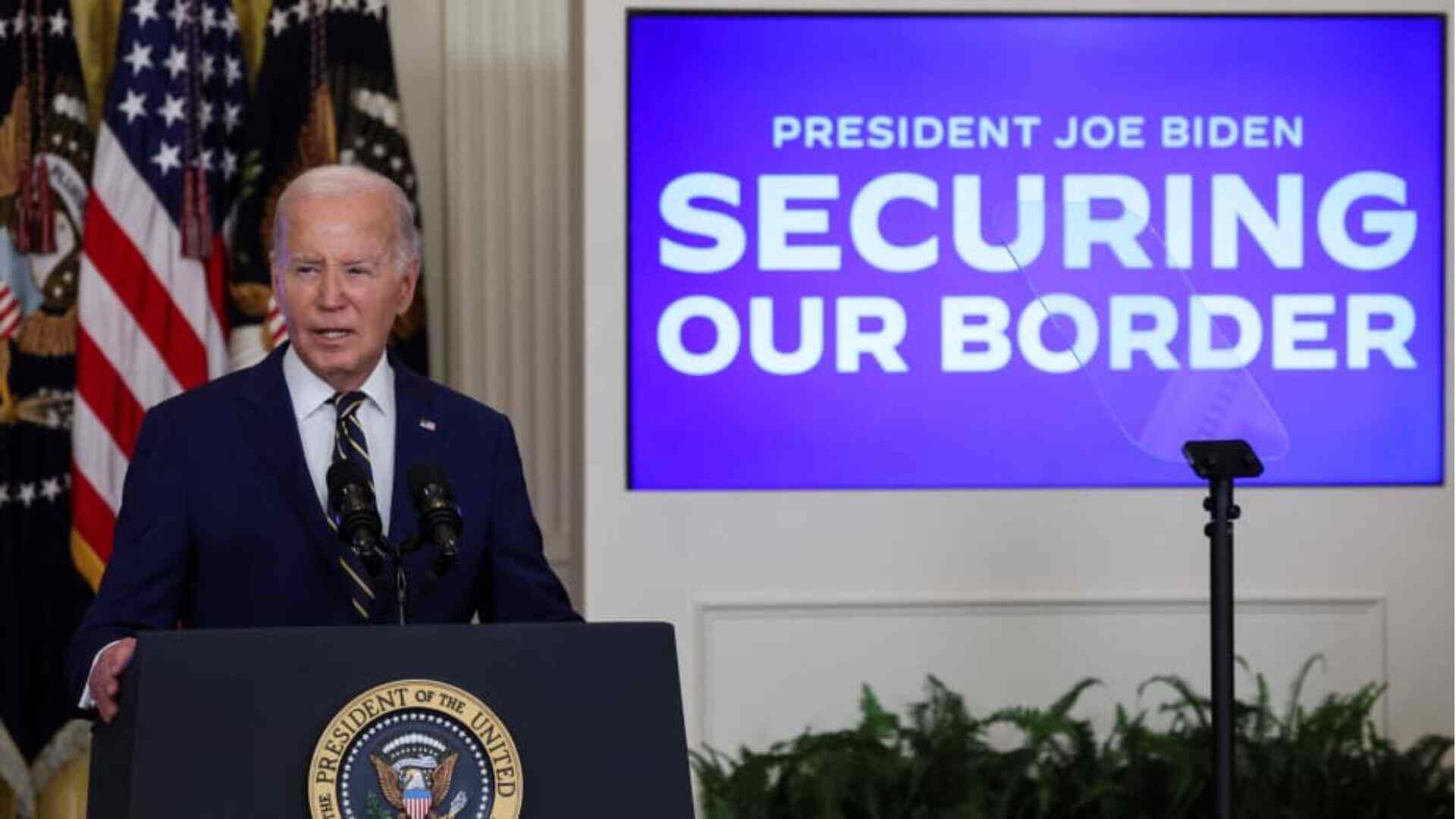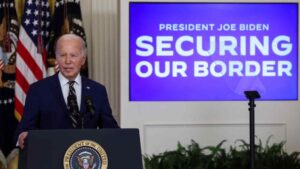President Joe Biden on Tuesday unveiled plans to enact immediate significant restrictions on migrants seeking asylum at the US-Mexico border as the White House tries to neutralize immigration as a political liability ahead of the November elections.
The eagerly awaited presidential declaration would prevent migrants from receiving asylum if American authorities determine that the southern border is facing excessive strain. The Democratic leader had been considering independent measures for several months following the breakdown of a bipartisan agreement on border security in Congress, which was largely opposed by Republican lawmakers under the influence of former President Donald Trump, who is expected to be the GOP’s nominee.
Biden said he preferred more lasting action via legislation, but “Republicans have left me no choice.” Instead, he said he was acting on his own to “gain control of the border” while also insisting that “I believe immigration has always been the lifeblood of America.”
Trump “told the Republicans … that he didn’t want to fix the issue, he wanted to use it to attack me,” Biden said. “It was a cynical, extremely cynical, political move and a complete disservice to the American people who are looking for us not to weaponize the border but to fix it.”
Trump, on the other hand, used his social media account to assail Biden again over immigration, saying the Democrat had “totally surrendered our Southern Border” and his order was “all for show” ahead of their June 27 presidential debate.
When Will Biden’s New Border Policy Go Into Effect?
The directive will become operational once the number of border encounters between entry points reaches 2,500 per day, as stated by senior administration officials. This implies that Biden’s directive should be implemented promptly, given that current daily averages surpass this threshold. The average daily apprehensions for unauthorized crossings from Mexico were last under 2,500 in January 2021, coinciding with Biden assuming office. The last instance of border encounters dropping to 1,500 per day was in July 2020, during the peak of the COVID-19 pandemic.
The restrictions would be in effect until two weeks after the daily encounter numbers are at or below 1,500 per day between ports of entry, under a seven-day average. The Associated Press first reported those figures on Monday.
Homeland Security said increased enforcement with Mexico since high-level bilateral meetings in late December has lowered illegal crossings but is “likely to be less effective over time,” creating a need for more action. “Smuggling networks are adaptable, responding to changes put in place,” the department said in a federal rule published Tuesday.
The department anticipates that daily averages of arrests for unauthorized border crossings could increase to as much as 6,700 from July to September.
Under the implementation of this order, individuals arriving at the border who do not articulate a fear of returning to their home nations will face swift deportation from the United States, possibly within a short span of days or even hours. These migrants may be subjected to penalties such as a five-year ban on reentering the U.S. or potential criminal charges.
Meanwhile, anyone who expresses that fear or an intention to seek asylum will be screened by a U.S. asylum officer but at a higher standard than currently used. If they pass the screening, they can pursue more limited forms of humanitarian protection, including the U.N. Convention Against Torture.
“We’re troubled to see this administration raise the bar on asylum seekers who are coming to our southern border and exercising a legal right,” said Krish O’Mara Vignarajah, president and CEO of Global Refuge. “Certainly no one wants to see migrants who may be coming to seek a better life or for economic opportunity game the asylum system, but we see in our clients and in other immigrants people who are fleeing the direst of circumstances at a time of unprecedented global migration and believe that the U.S. is still a beacon of hope and refuge.”
On Tuesday, there were no apparent indications of an immediate effect at the border.
Iselande Peralta, a Haitian mother residing at a migrant shelter in Reynosa, Mexico, with her 3-year-old son, expressed that the U.S. was justified in implementing new regulations. She has been attempting for 10 months to secure an appointment via U.S. Customs and Border Protection’s online application, known as CBP One. Aged 26, Peralta is steadfast in her refusal to consider illegal border crossings and views CBP One as her most viable alternative.
“Even if I was crazy, I wouldn’t cross the river. How would I do that with a child as young as him? I’m willing to wait,” she said.
Biden’s directive is coming when the number of migrants encountered at the border have been on a consistent decline since December, but senior administration officials say the numbers are still too high and could spike in better weather, as is typical.
How Biden’s Directive Would Be Implemented?
For example, the administration presently maintains an arrangement with Mexico wherein Mexico consents to accept up to 30,000 individuals per month from Cuba, Haiti, Nicaragua, and Venezuela following their denial of entry into the U.S., as per senior administration sources, who affirm that this arrangement will persist under the current order. However, it remains unclear what protocols will be followed for nationals of other countries who are refused entry under Biden’s directive.
Four senior administration officials, speaking on the condition of anonymity to reporters, acknowledged that Biden’s objective of expeditiously deporting migrants is complicated by inadequate funding from Congress for such endeavors. Additionally, the administration confronts legal limitations concerning the detention of migrant families, and it affirms its commitment to complying with these legal obligations.
The legal authority being invoked by Biden comes under Section 212(f) of the Immigration and Nationality Act, which allows a president to limit entries for certain migrants if their entry is deemed “detrimental” to the national interest. Senior officials expressed confidence that they would be able to implement Biden’s order, despite threats from prominent legal groups to file lawsuits over the directive.
“We intend to sue,” Lee Gelernt, an attorney for the American Civil Liberties Union who successfully argued similar legal challenges when Trump was president. “A ban on asylum is illegal, just as it was when Trump unsuccessfully tried it.”
The senior administration officials insisted that Biden’s proposal differs dramatically from that of Trump, who leaned on the same provisions of the Immigration and Nationality Act that Biden is using, including Trump’s 2017 directive to bar citizens of Muslim-majority nations and his efforts in 2018 to clamp down on asylum.
It could also be difficult for border officials to quickly remove migrants when many agents are already tasked with helping in shelters and other humanitarian tasks, said Jennie Murray, the president of the National Immigration Forum.
“Customs and Border Protection cannot keep up with apprehensions as it is right now because they don’t have enough personnel so it would cause more disorder,” she said.
Republicans dismissed Biden’s order as nothing more than a “political stunt” meant to show toughened immigration enforcement ahead of the election.
“He tried to convince us all for all this time that there was no way he could possibly fix the mess,” GOP House Speaker Mike Johnson said at a news conference. “Remember that he engineered it.”
During a call arranged by Trump’s campaign, Stephen Miller, a senior adviser in Trump’s White House known for devising his most contentious immigration strategies, along with Tom Homan, the former acting director of Immigration and Customs Enforcement during the Trump administration, asserted that Biden’s directive would effectively permit the entry of 2,500 individuals into the country each day and legitimize illegal entry into the U.S.
“The only reason they’re doing this is because of the election,” Homan said. “They’ve had three and a half years to take action and done nothing.”
Democratic Senate Majority Leader Chuck Schumer said legislation would have been more effective, but “Republican intransigence has forced the president’s hand.”














